"Salt and Light"
by Rev. Dr. Mark D. Roberts May 2004
Note: You may download this resource at no cost, for personal use or for use in a Christian ministry, as long as you are not publishing it for sale. All I ask is that you give credit where credit is due. For all other uses, please contact me at mark@markdroberts.com . Thank you.
| Table of Contents | |
| Part 1 | Forgiving Our Dentist? |
| Part 2 | The Church that Helps People |
| Part 3 | The Pizza Church |
| Part 4 | Rallying Against Hate |
| Part 5 | Skipping Church as a Strategy for Evangelism |
| Part 6 | Being Light, Not Lighting Up |
| Part 7 | Grace and Grumpiness |
| Part 8 | Random Acts of Kindness |
Forgiving Our Dentist?
Part 1 of the series "Salt and Light"
Posted at 10:00 p.m. on Friday, May 21, 2004
When my daughter Kara was four years old I taught her to say the Lord’s Prayer. Well, at least a version of the Lord’s Prayer. You see, Kara had trouble articulating some of the tricky language of this prayer. For “Hallowed be they name” she said, “Hollywood be my name.” Better still, in place of “Forgive us our debts as we forgive our debtors” Kara chimed in with “Forgive us our dents as we forgive our dentist.” No joke! Though she had only been to the dentist once in her short life, Kara figured that he needed some forgiveness. Indeed, many dentists do!
The dentist who looked after my teeth when I was growing up needed more than a some forgiveness. From my youthful perspective, he was mean. It wasn’t just that he hurt me when giving me fillings, which, I suppose, was inevitable. But he wasn’t kind about it. Gruffness and intimidation ruled in his office, and I submitted to the whole painful, humiliating process.
Once I had left home for college and didn’t have parents who made me go to the dentist, I stopped going altogether. In fact, from the time I was eighteen until I was forty, I made only one visit to a dentist, and this because my wife set up the appointment and lovingly pressured me to go. But, once I turned forty, I knew that I would pay a heavy penalty if I continued avoiding dentists, so I resolved to face my fears head on and start going to the dentist on a regular basis.
By God’s grace, I began seeing Dr. Richard Oliver. Now, seven years, four crowns, three filling replacements, and fourteen cleanings later, I can truly say that my experiences of Dr. Oliver and his staff have actually been painless and almost, dare I say it, pleasant.
Take my most recent visit, for example. When I arrived for my appointment I had to wait about thirty seconds before Ruth, my hygienist, invited back to her office. That’s an average wait in Dr. Oliver’s office: thirty seconds! How many medical or dental offices could measure up to this level of respect of patients and their time? On my walk back to Ruth’s cubicle, a couple of people greeted me pleasantly. Ruth, always friendly, quickly got down to the business of cleaning my teeth. Her work was flawless. A couple of times she checked in with me to make sure she hadn’t hurt me, which she hadn’t. My teeth were in very competent hands.
I didn’t need to see Dr. Oliver during this visit. But when he’s worked on me in the past, I’ve marveled at his skill and care. Through all of those crowns and fillings, never once have I felt any pain, not even when he has given me those dreaded Novocaine shots – the ones that made me cry when I was a child. The only fear I have left of dentists is that someday Dr. Oliver will retire and I’ll have to find a new dentist. (Truly, I do think of this almost every time I leave his office. The good news is that Dr. Oliver’s son is following in his father’s footsteps!)
The outside of Dr. Oliver’s practice is deceptively humble: a storefront in a small shopping center in La Palma, California. The inside, while not plush, has been carefully designed to maximize the comfort – might I almost say – the enjoyment of the patient. Dr. Oliver is a Christian, who, along with his partners and staff, sees offering high-quality, caring dentistry as a ministry. His practice makes a special effort to provide affordable medical care for all people, including those of limited financial means. When I consider the way Dr. Oliver and company operate, I think of Jesus’ statement that we are to be salt and light in the world. |
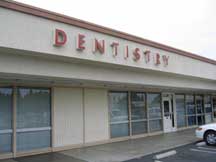 |
Tonight when I tuck my daughter into bed and pray with her, she won’t mess up the words of the Lord’s Prayer. She now knows that we need forgiveness for our “debts,” not our “dents,” and that we need to forgive our “debtors,” not our “dentist.” The truth is that I have no need to forgive my dentist anymore. What I feel for my dentist these days is no longer anger and fear, but appreciation and gratitude.
The Church That Helps People
Part 2 in the series “Salt and Light”
Posted at 10:00 p.m. on Saturday, May 22, 2004
| One day while I was an associate pastor at the First Presbyterian Church of Hollywood, a woman came to the church office seeking help. Her desperation was obvious as I began to speak with her.
“You’ve got to help me,” she said. “I’m about to be evicted from my apartment. If this happens, I’ll be homeless. I don’t have anywhere to go.” “Why are you going to be evicted?” I asked. |
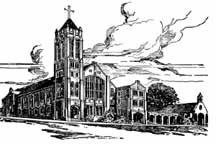 |
|
A sketch of the First Presbyterian Church of Hollywood |
||
“Because I’m not up to date on my rent. A few weeks ago I lost my job, so I have fallen behind in my payments. But I have a new job. It starts next week. I’ll be able to pay then. But if I’m evicted, I’ll lose my apartment and my security deposit. I don’t know what I’ll do.”
“What would you like me to do for you?” I queried.
“I’d like you to come and talk to my manager. Maybe you could convince him to let me stay for a couple more days.”
This plan seemed like a shot in the dark to me, but I consented. First I called the woman’s new employer, just to confirm her story. Everything checked out. Then I drove the woman to her apartment building. When we arrived, we found the manager. He scowled as we approached.
“Hello,” I said, extending a hand and trying to smile. “I wonder if I might speak to you for a moment.”
Refusing my hand, he said, “I don’t want to talk to you. She needs to get her stuff out now.”
“I understand your concern,” I continued gently, “but I’m wondering if we could talk about her situation. I’m one of the pastors at the Hollywood Presbyterian church over there, and I’d like to see if we can work out a situation so this woman can stay here.”
“No way,” he insisted. “She hasn’t paid her rent. She needs to leave.”
“But she has a job that will start next week, then she can pay.”
“I’ve heard that line before,” he objected. “You can forget it . . . . Wait a minute! Where did you say you were from?”
“I’m one of the pastors at the Presbyterian church,” I answered, handing him my business card.
“I know about your church,” he said in a firm voice as I braced myself for some critical remark, “and I know that your church helps people. A friend of mine was going through a hard time and you people helped him out.”
“We try,” I admitted.
“Okay,” he said in a much kinder voice, “because you’re vouching for her, I’ll let the woman stay. But only until the end of next week. Then she’ll have to pay.”
“Great,” I replied. “If you have any problems, you’ve got my card.”
With that, I turned to say good-bye to the stunned, grateful woman and then climbed back into my car. On my way back to church I thought I had witnessed a miracle. Such a change of heart in the manager! And it wouldn’t have happened except for the reputation of the church in the community.
Of course it doesn’t always work out this way. But how I wish all churches were known in their communities as being helpful to people. It’s part of what Jesus described as being salt and light in the world:
“You are the salt of the earth; but if salt has lost its taste, how can its saltiness be restored? It is no longer good for anything, but is thrown out and trampled under foot. You are the light of the world. A city built on a hill cannot be hid. No one after lighting a lamp puts it under the bushel basket, but on the lampstand, and it gives light to all in the house. In the same way, let your light shine before others, so that they may see your good works and give glory to your Father in heaven. (Matt 5:13-16)
In my next post I’ll describe a very different way of being salt and light in a very different kind of community. Stay tuned . . . .
The Pizza Church
Part 3 in the series “Salt and Light”
Posted at 10:00 p.m. on Sunday, May 23, 2004
| In my last post I described how my former church, The First Presbyterian Church of Hollywood, had earned a good reputation in its community by offering help to people in need. My current church, Irvine Presbyterian, is located in the midst of an upper-middle class suburb. Although our neighbors sometimes deal with the threat of homelessness, this is relatively rare. Our challenge, therefore, is to figure out how we can be salt and light in our own place and time. One answer: Pizza Lunch!
Recently I was chatting with a young woman who worked at Tully’s Coffee, a favorite coffee bar in Irvine. “You’re a pastor, right?” she asked. “Yes, I am” I answered. |
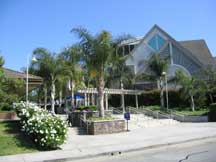 |
|
The patio of Irvine Presbyterian Church. Though quiet today, things will be quite different on Friday at lunchtime. |
||
“Where is your church at?” she said, with questionable grammar.
“I’m pastor of the Presbyterian church over that way,” I replied, pointing in the general direction of my church.
“Across from the high school?” she asked, with excitement in her voice.
“Yes, right across from Woodbridge High School,” I said.
“YOU’RE THE PIZZA CHURCH!” she exploded. “I’ve been to your church. It’s cool!”
“The Pizza Church,” now that’s a name I hadn’t heard before. Frankly, I rather like it. I knew what this girl was referring to. For the last several years, every Friday we serve a simple lunch of pizza and soda to about 300 high school students. We charge what it costs us, not including countless volunteer hours from those who serve the pizza. We do this as a way of showing hospitality to the students, most of whom wouldn’t otherwise step foot on our church campus. In time, some become friends and even begin to be part of our youth group. Others are like the young woman in Tully’s, an occasional pizza patron, nothing more.
But even if the majority of the Pizza Lunch students never make it to a worship service or youth group meeting, at least they come away with a positive experience of church. They think of our church as a friendly place where they are welcome. My hope and prayer is that, in time, this will make it easier for these student to darken the door of a church when they’re looking for something more important than pizza.
In Matthew 25 Jesus tells the story of a king who surprises his subjects by rewarding them for caring for him. “For I was hungry and you gave me food, I was thirsty and you gave me something to drink, etc.” (Matt 25:35). I wonder, I just wonder, if someday Jesus will say to the Pizza Lunch volunteers, “For I was a hungry teenager and you gave me pizza, I was a thirsty student and you gave me a soda.”
Rallying Against Hate
Part 4 in the series “Salt and Light”
Posted at 10:00 p.m. on Monday, May 24, 2004
Some time ago, Michael Coffey moved to Garden Grove, a city in Orange County, not far from where I live. An African-American living in a neighborhood where he was a distinct minority, Coffey heard occasional racial slurs from some of the neighborhood youths. But then he was shocked to find a cross burning on his front lawn, a sadly ironic sign of racial hatred. The next Sunday afternoon, Coffey was shocked once again by what he saw in front of his home. This time, however, it was a happy surprise. About fifty people gathered to show their support for Coffey and to protest against racial hatred. These were Christians from several churches in Orange County, who had come after Sunday services to demonstrate. |
 |
|
The cross, a symbol of love and life, becomes a symbol of hatred and death when burned on someone's front lawn. |
||
The leader of the rally, Frank Eilkor, explained their purpose: “Hate is a cancer that will never go away unless that cancer is removed by community support. The cancer that goes to Mr. Coffey today can come for me tomorrow."
A pastor from one of the participating churches added, "Jesus said love your neighbor. He didn't say love your white neighbor. We're just here to say we love you."
When the demonstrators learned that Coffey had also been victimized by some renters who had vandalized his property, they offered to return the next weekend to help him repair the damage.
Don’t you love this story? I do. It’s such a great picture of the church in action, fighting hatred and extending the love of Christ. In a world that is becoming more and more violent and hateful, we Christians have an exceptional opportunity – and a excellent responsibility – to live as salt and light, so that people might see the presence of God in us. Fighting racial hatred and helping a victim restore his property – what better way to shine with the light of Jesus!
(You can read the whole story from an article in the LA Times, but you’ll have to pay for it.)
Skipping Church as a Strategy for Evangelism
Part 5 in the series “Salt and Light”
Posted at 10:00 p.m. on Tuesday, May 25, 2004
In college I was an active member of the Harvard-Radcliffe Christian Fellowship. This group, which met weekly for worship and teaching, emphasized the importance of small groups. So I joined a small group in my freshman year, and soon it was essential to my life. In this group I found support, love, challenge, and prayer. I never missed my weekly small group meeting, no matter how late I had to stay up doing homework because I’d spent two hours at the group.
| One of the things I shared with my small group was my concern for my roommate Henry. I liked Henry a lot, but he was not a Christian. Though he seemed to be interested in Christianity, he had lots of reasons for his lack of faith. And, though Henry and I frequently talked about my faith, he seemed strangely resistant.
In February of our freshman year, Henry received terrible news from his sister who lived in Henry’s home state of Florida. Their mother, who had symptoms of Alzheimer’s, had taken a decided turn for the worst. Henry was deeply worried by this news, wondering if he should quit school and go home. “Let’s talk about it over dinner,” I suggested. “But you’ve got your small group tonight,” Henry objected. “You always have dinner with your group on Wednesdays.” |
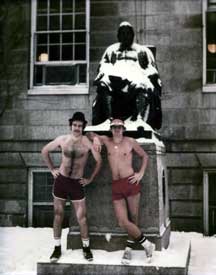 |
|
My roommate Henry (right) and me in front of the statue of John Harvard. |
||
Now I was confused. Henry spoke the truth. I did always eat with my group on Wednesdays. And I didn’t want Henry to think that my small group wasn’t important in my life. Yet, I felt like I should be with him, not my group. Yet, on the other hand, I knew the other group members would worry if I didn’t show up. (Remember, this was long before cell phones!) Still, it seemed like staying with Henry was the right thing to do.
“I know I never miss my group,” I finally answered, “but I think I need to hang out with you tonight. Let’s go have dinner.”
So we did. And we talked and talked, long into the night. Partly we talked about God and faith and how God could let this happen to Henry’s mother.(Henry's father had died several years earlier.) Though Henry didn't become a Christian that night, I sensed a striking change in his attitude. It was as if he now trusted my opinions rather than always wanting to challenge them.
Throughout the next year and a half Henry and I spent hours and hours talking about Christianity. Then, in the summer before our junior year, he gave his life to Christ.
I asked Henry once why his attitude toward me, and, indeed, toward Christianity in general, changed from where it had been early in our freshman year. “It started that night,” he explained, “when you skipped your small group to be with me. Until that night, I never really trusted you. I had known other Christians in high school and they always ended up being hypocrites. But when you were willing to miss your group – I knew how much it meant to you – then I knew that your faith was genuine.”
When I tell this story in a sermon, I always wonder what will happen. Will members of my church start making it a habit to skip church in order to hang out with their non-Christian friends? Will the local golf courses be filled with my church members on Sunday mornings as they try to show love to their non-believing friends? So far this hasn’t happened. But, in spite of how much I think involvement in Christian fellowship is essential, there are times when skipping a small group or a worship service is exactly the right thing to do. It’s all part of being the salt of the earth – not sequestered in the salt shaker – but sprinkled out into the world.
Being Light, Not Lighting Up
Part 6 in the series “Salt and Light”
Posted at 10:00 p.m. on Wednesday, May 26, 2004
In my last post I shared a story from my college days. I’ve got one more like this to add to the “Salt and Light” series.
Laurie was one of those enthusiastic new Christians you like to be around. She’d only been a believer for a couple of months when I met her, and she sparkled with the joy of newfound faith. She loved Jesus and she loved to tell people about him.
But Laurie was finding it difficult to talk about her faith with her roommate. The roommate wasn’t especially negative about Christianity, but was simply unwilling to open up about her own beliefs. Laurie was frustrated, and asked the Christian fellowship to pray for her relationship with her roommate.
| A couple of weeks later Laurie came to the fellowship group meeting with great news. She and her roommate had just had a great talk about Christ. Laurie was ecstatic, and wanted to give public thanks to God in the meeting.
Somebody asked her how it happened. “What helped your roommate to open up?” he wondered. “Oh, I had a great idea,” Laurie boasted. “I knew my roommate would never loosen up in her normal state, so I smoked dope with her! When she was high, she was really open and wanted to talk!” |
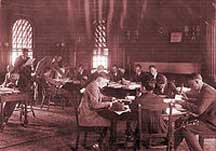 |
|
The parlor of Phillips Brooks House at Harvard, the place of Laurie's announcement. This picture was taken about 60 years earlier, however. |
||
You could have heard a pin drop in the fellowship meeting. Poor, sweet, well-meaning, naïve Laurie had no idea that everyone else in the room believed that Christians should not become intoxicated, whether with alcohol or drugs. From our point of view, Laurie’s strategy required her to act in ways contrary to the imperative of Scripture, “Do not get drunk with wine, for that is debauchery; but be filled with the Spirit” (Ephesians 5:18).
I was glad that nobody criticized Laurie in the meeting. One of the more mature women in the fellowship took her aside afterwards and talked with her about the inappropriateness of smoking dope with a roommate. Laurie was surprised at first, but then understood the problem.
Please understand that I’m not holding up Laurie’s action as something to be imitated. We’re to be light, not to light up! I don’t believe Christians should become intoxicated, no matter what the substance. (Well, okay, coffee and donuts are permissable.) But I do appreciate Laurie’s heart. In her zeal to share Christ with a roommate she made an unwise choice. But at least she had such zeal! I know many, many Christians who’d never think of using marijuana – and who’d never think of sharing Christ with their non-Christian friends.
So, though I hope I have more discernment than Laurie did, I also hope I have her heart for Christ and for those in my life who don’t know him. Even if I won’t light up with my friends, I am called to be a light in the world. And so are you.
Grace and Grumpiness
Part 7 in the series "Salt and Light"
Posted at 10:00 p.m. on Thursday, May 27, 2004
The line in the hardware store was long, slow, and frustrating. I could feel my blood pressure rising by the minute, but I tried to stay calm. The man in front of me in line, however, gave up on calmness. He was angry.
As we were waiting, this guy began to complain about everything, the crowd, the heat, you name it. He was not happy about anything. When it was finally his turn to check out, he hassled the poor clerk relentlessly. “It isn’t her fault,” I thought to myself, but didn’t want to say anything for fear that the angry man would punch me out.
When I finally had my turn to check out, the clerk said to me, “This must be a grumpy day!” “Yeah,” I agreed, “that guy was in some kind of mood, wasn’t he?”
| As I was walking to my car, I saw the grumpy man driving out of the parking lot. As he turned, I noticed his prominent bumper sticker: “Saved by Grace through Faith.” Ouch! This was the last guy in the world I would have expected to display a Christian bumper sticker. And, frankly, I saw very little evidence that he was saved by grace through faith. Trapped in eternal grumpiness would be more like it! |  |
Now I’m not questioning this man’s faith or salvation. Even the finest Christian can have a bad day every now and then. But I’m reminded by this guy’s negative example that I should live in such a way that people experience God’s grace through me. Patience, kindness, love – these are the fruit of the Spirit, the result of living in God’s grace through Christ.
So, if you find yourself in a slow line at the hardware store today, or if somebody cuts you off on the highway, or if your kids are driving you crazy, step back and remember that you have been saved by grace through faith. Let God’s grace be an antidote to grumpiness. As grace fills your heart and shapes your behavior, you’ll be salt and light in the world.
Random Acts of Kindness
Part 8 in the series “Salt and Light”
Posted at 10:00 p.m. on Friday, May 28, 2004
| Every year around Christmastime the junior high department of my church engages in one of their so-called “Random Acts of Kindness.” (In truth, these acts are carefully planned and not especially random. But who’s quibbling? Kindness is the real point.) A couple dozen junior highers with a few leaders gather up tons of wrapping paper, tape, and ribbon, and head off to the local Target department store. There, with the permission of the management, they set up a free gift wrapping booth. It’s really free, without gimmicks. Though they explain that they’re from Irvine Presbyterian Church, they won’t even receive donations should someone offer. These can go in the Salvation Army pail a few yards down the sidewalk. |  |
Several months after the latest gift-wrapping extravaganza at Target, I was out in a local coffee bar enjoying a latté. A woman came up to me and said, “You’re the pastor of Irvine Presbyterian Church, right?”
“Yes,” I answered, curiously. (You never know what to expect with this opening line.)
“Well, I want to tell you something about your church,” she said. I couldn’t tell from her affect whether I was about to hear something good or bad, so I prepared my defenses as she continued.
“Last December I was shopping at Target. I came out of the store and stumbled into your junior high department. They were doing that free gift wrapping thing, you know. Well, at first I thought there was some gimmick, like a fund-raiser or something. But the kids assured me that they were simply trying to help people. So I let them wrap a whole bunch of my presents. As I did, I watched them. I watched how they treated each other. I felt how they treated me. There was such love there, such care. I was blown away.”
At this point the woman was beginning to cry.
“I’ve been in lots of churches. And I’ve always been one of the workers, you know, one of those who gives and gives and gives. But I don’t think I’ve ever seen the kind of love I saw among your junior highers. And I don’t know when anyone has ever done something for me simply to be kind. I want you to know how much it meant to me. It was really wonderful. You’ve got a great church.”
How grateful I was! (Just for the record, I have nothing to do with this event. It was the idea of my junior high director, and he and his crew pull it off. I just get to enjoy people's gratitude.)
Of course I know that I also have a very human church. The junior highers don’t always love each other so meritoriously, and neither to we adults, for that matter. But there are times when we live as if we really were brothers and sisters in Christ, members of his body who genuinely care for each other.
Part of being salt and light in the world involves serving people out in the world, whether by rallying on their behalf when they’re victims of racism, or even by wrapping their Christmas gifts. But an essential part of our shining with the light of Christ has to do with how we treat each other. If we love one another – and if we forgive when love falls short – the world will see something distinctive in us, the presence of the living God. And his presence will shine through us into the dark world that so desperately needs heavenly illumination.